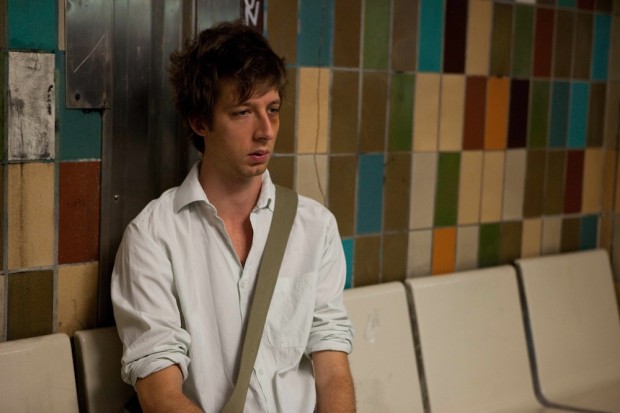An iconographic and text archive related to communication, technology and art.
Daylight is fading. The tall trees that line the Institute grounds are bombarded by light. Never have they appeared so cruel to me and never have I felt so much like a prisoner. Troubled, too, by what I’m writing, I’m very weary and tempted to give in to inertia the way one gives in to a fascination. Why should I go on writing and what shall I say? Why draw curves on paper when I long to go out, to stroll, to run towards the woman I love, to abolish myself in her and sweep her away with me into my resurrection and towards death?
☛ Next Episode by Hubert Aquin, tr. by Sheila Fischman, Toronto: McClelland & Stewart, [1965]2001, chap. 1
This excerpt is from a novel by the famous French-Canadian author Hubert Aquin. It was first published in French in 1965 as Prochain épisode. Here’s the original version:
Le jour commence à décliner. Les grands arbres qui bordent le parc de l’Institut sont irradiés de lumière. Jamais il ne me sont apparus avec tant de cruauté, jamais encore je ne me suis senti emprisonné à ce point. Désemparé aussi par ce que j’écris, je sens une grande lassitude et j’ai le goût de céder à l’inertie comme on cède à une fascination. Pourquoi continuer à écrire et quoi encore? Pourquoi tracer des courbes sur le papier quand je meurs de sortir, de marcher au hasard, de courir vers la femme que j’aime, de m’abolir en elle et de l’entraîner avec moi dans ma résurrection vers la mort (Leméac éditeur, Montréal [1965]1992, p. 14)
I first became aware of this excerpt while watching Laurentie, an interesting film by Mathieu Denis and Simon Lavoie (2011, produced by Metafilm, distributed by FunFilm, Facebook Page, Telefilm Canada, official trailer on YouTube, official press kit for Cannes 2011).
It certainly is possible to read this film as a commentary on Quebec history as a Canadian province and as an aspiring independent country. However, I believe it is also possible to see it as a much broader commentary on how we live today in relation to the world and with each other (this goes for the theme of political sovereignty as well). Or, to put it in a different way, it is a commentary addressing the ways in which two major problems come to light nowadays: how do I exist as a human being and how can I co-exist with other human beings? Those two problems have shaped and are still shaping the landscape of modernity (Descartes’s cogito and Hobbes’ Leviathan could be used as historical marker in this matter).
From this perspective, all the local references in the film Laurentie work together to produce an allegory for a universal problem. The fate of the main character is intrinsically related to the fate of the society/community his living in: they are two co-emergent phenomena. The strong temptation one can feel to reject his idiosyncrasies or to reject him all together is part of the problem we all have to face, alone and together.
From the synopsis of the film available in the press kit:
My name is Louis Després. I am 28 years old. I live in Montreal, in this fucking shit-hole of a province. I don’t know what I like. I don’t know who I like. I don’t know what I want to do with my life. I don’t know who I am.
One thing I do know is that I am not the Other.
The Other who is beautiful, who speaks a beautiful and seductive tongue – which I do not speak. He is surrounded by friends – I don’t have any. He is happy – I am not. A short time ago, the Other became my next door neighbour. His presence next to me, the sole fact of his existence, constantly bring me back to my own sorry state, and feel ever more intolerable.
Aquin wrote about a feeling of inertia while Louis Després testimony is concerned with his “sorry state” and an ever growing intolerable feeling. Aquin wrote in 1965, while Laurentie opened this year. However, those “existential” feelings are neither new nor uncommon. In the very first chapter of Stanze, Giorgio Agamben offers a short and rough draft of what could become a genealogy of our modern “mal de vivre”: a state of being that can be traced back to the antic acedia (irreducible to the modern understanding we have of slothness). It’s especially interesting to learn that acedia etymologically means “a lack of care” (see Roland Barthes Comment vivre ensemble. Cours et séminaires au Collège de France (1976-1977), Paris: Seuil / IMEC, 2002, p. 53; see also κήδ-ω in A Greek-English Lexicon by Henry George Liddell and Robert Scott, revised and augmented throughout by. Sir Henry Stuart Jones, with the assistance of Roderick McKenzie, Oxford: Clarendon Press, 1940).
In the film, this lack of care is clearly a threat both to the protagonist and to his entourage (his community and, to a certain extent, the society he’s living in). What exactly is this threat? It concerns the unity or the coherence both of the individual body and mind, and the societal organization: they both risk disintegration, falling apart, losing their humanity. This laic threat has a religious history: sin is what destroys our relationship (our communion) with God and other human beings (see A concise dictionary of theology by Gerald O’Collins and Edward G. Farrugia, 2004, p. 244). In religious term, the mean to counter this threat is excommunication: instead of waiting for a sinner to destroy himself and the bonds that keep us together, he must be expelled, put away.

